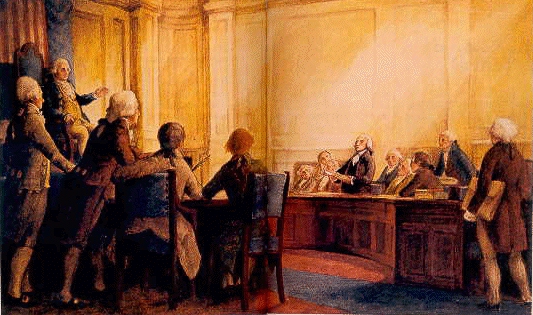|
|
Repeated Debates
Certain debates occurred in many states due to their nature. These issues were commonly divisive and over fundamental differences in people's ideas of what a Constitution should be.
|

A BILL OF RIGHTS? |
One such debate was the battle over whether the Federal Constitution should include a Bill of Rights to protect certain inalienable rights from the government. Main arguments supporting a Bill of Rights hinged on the fact that, without one, the Federal government could essentially trample on any rights that were not protected.
Those arguments supporting a Bill of Rights relied on the Constitution itself to protect the rights of the citizens - since the people gave the Federal government power, it could not exercise any power that the people did not specifically grant.
|
| Power Players |
| Virginia |
Defending the Bill of Rights were George Mason, Patrick Henry, and James Monroe.
Against stood James Madison and Henry Lee.
|
| Pennsylvania |
Defending the Bill of Rights were John Smilie and the Anti-Federalists (Constitutionalists).
Against the Bill of Rights stood James Wilson and the Federalists.
|
| Massachusetts |
Defending the Bill of Rights were Eldridge Gerry, Samuel Adams, and John Hancock.
Against the Bill of Rights stood John Adams (although he was not present), and John Varnum.
|
| The “We the People” in the preamble of the constitution was subject to intense debate among delegates in every state as the verbiage lends itself to different meanings on the principles of government. The phrase hits at the crux of the question: from what power is the government derived? In this case, the opposing sides used this phrase to argue for and against the power of the people, the power of the states, the fear of consolidation, and the definition of rights” People who supported the “We the People” were, at their core, federalists who believed in a strong federal government where the power comes directly from the people. Those who were avidly opposed stated their arguments in a perspective of the protection of states’ rights and the fear of power consolidation. Moreover, the “We the People” clause incited discussion over another relevant debate on the necessity for a bill of rights. |

WE THE PEOPLE? |
Virginia |
Edmund Pendleton, Francis Corbin, and the other federalists argue that the “We the People Clause is necessary for the protection of the power and the rights of the people”. In Pendleton’s argument, he states that this phrase is a necessity because the government before—the articles of confederation—was completely inadequate in maintaining the spirit of America.
Patrick Henry and the anti-federalists do not like “We the People” clause and insist of the change. Henry states that the phrase should be “we the states”. His argument makes the claim that the convention exceeded their power in claiming to represent the entirety of the people but they can make the claim that they adequately represent the entirety of the states. |
Pennsylvania |
James Wilson and the Federalists supported the We the People phrase because they agreed that the power of government needed to be derived from the people. Wilson also stated that this phrase was enough to protect the people rights because since the people are empowering the government all of their rights are inherent and do not need to be enumerated.
John Smilie and the Anti-federalists were against the We the People clause because they feared that this clause would completely negate the state governments. Moreover Smilie did not believe that the We the People clause could protect the rights of the people. |
Massachusetts |
John Adams, John Hancock and the Federalists supported the We the People Clause.
Major Nason and the antifederalists were against the We the People clause under the basis that it would completely annihilate the state governments and place all of power into the hands of the federal government. |
|